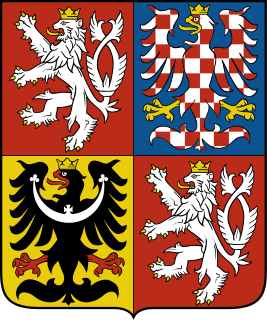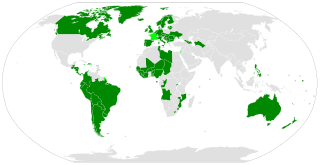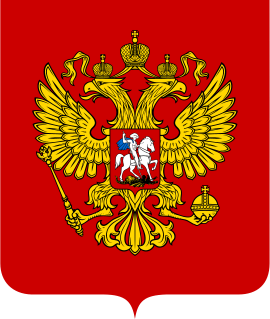
Naturalization is the legal act or process by which a non-citizen of a country may acquire citizenship or nationality of that country. It may be done automatically by a statute, i.e., without any effort on the part of the individual, or it may involve an application or a motion and approval by legal authorities. The rules of naturalization vary from country to country but typically include a promise to obey and uphold that country's laws and taking and subscribing to an oath of allegiance, and may specify other requirements such as a minimum legal residency and adequate knowledge of the national dominant language or culture. To counter multiple citizenship, some countries require that applicants for naturalization renounce any other citizenship that they currently hold, but whether this renunciation actually causes loss of original citizenship, as seen by the host country and by the original country, will depend on the laws of the countries involved.
In international law, a stateless person is someone who is "not considered as a national by any state under the operation of its law". Some stateless people are also refugees. However, not all refugees are stateless, and many people who are stateless have never crossed an international border. On November 12, 2018, the United Nations High Commissioner for Refugees stated there are about 12 million stateless people in the world.

Dutch nationality law details the conditions by which a person holds Dutch nationality. The primary law governing these requirements is the Dutch Nationality Act, which came into force on 1 January 1985. Regulations apply to the entire Kingdom of the Netherlands, which includes the country of the Netherlands itself, Aruba, Curaçao, and Sint Maarten.

Austrian nationality law details the conditions by which an individual is national of Austria. The primary law governing these requirements is the Nationality Law, which came into force on 31 July 1985.

Icelandic nationality law is based upon the principles of jus sanguinis. In other words, descent from an Icelandic parent is the primary method of acquiring Icelandic citizenship. Birth in Iceland to foreign parents does not in itself grant Icelandic citizenship.

The citizenship law of the Czech Republic is based on the principles of jus sanguinis or "right by blood". In other words, descent from a Czech parent is the primary method of acquiring Czech citizenship. Birth on Czech territory without a Czech parent is in itself insufficient for the conferral of Czech citizenship. Every Czech citizen is also a citizen of the European Union. The law came into effect on 1 January 1993, the date of the dissolution of Czechoslovakia, and has been amended in 1993, 1995, 1996, 1999, 2002, 2003, and 2005. Since 1 January 2014, multiple citizenship under Czech law is allowed.

Polish nationality law is based primarily on the principle of jus sanguinis. Children born to at least one Polish parent acquire Polish citizenship irrespective of place of birth. Besides other things, Polish citizenship entitles the person to a Polish passport.

Slovenian nationality law is based primarily on the principles of jus sanguinis, in that descent from a Slovenian parent is the primary basis for acquisition of Slovenian citizenship. However, although children born to foreign parents in Slovenia do not acquire Slovenian citizenship on the basis of birthplace, place of birth is relevant for determining whether the child of Slovenian parents acquires citizenship.

Belarusian citizenship is membership in the political community of the Republic of Belarus.
Renunciation of citizenship is the voluntary loss of citizenship. It is the opposite of naturalization, whereby a person voluntarily obtains citizenship. It is distinct from denaturalization, where citizenship is revoked by the state.

Turkish nationality law is based primarily on the principle of jus sanguinis. Children who are born to a Turkish mother or a Turkish father are Turkish citizens from birth. The intention to renounce Turkish citizenship is submitted in Turkey by a petition to the highest administrative official in the concerned person's place of residence, and when overseas to the Turkish consulate. Documents processed by these authorities are forwarded to the Ministry of Interior (Turkey) for appropriate action.

The Convention on the Reduction of Statelessness is a 1961 United Nations multilateral treaty whereby sovereign states agree to reduce the incidence of statelessness. The Convention was originally intended as a Protocol to the Convention Relating to the Status of Refugees, while the 1954 Convention Relating to the Status of Stateless Persons was adopted to cover stateless persons who are not refugees and therefore not within the scope of the Convention Relating to the Status of Refugees.

Ukrainian nationality law details the conditions by which a person holds nationality of Ukraine. The primary law governing these requirements is the law "On Citizenship of Ukraine", which came into force on 1 March 2001.

Russian citizenship law details the conditions by which a person holds citizenship of Russia. The primary law governing citizenship requirements is the federal law "On Citizenship of the Russian Federation", which came into force on 1 July 2002.

The visa policy of Russia deals with the requirements which a foreign national wishing to enter the Russian Federation must meet to obtain a visa, which is a permit to travel to, enter, and remain in the country. Visa exemptions are based on bilateral or multilateral agreements. Russia has agreements with scores of countries whose citizens are either exempt from visas or can apply for a visa online (e-visa). Citizens of countries without such an agreement with Russia must obtain a visa in advance from a Russian diplomatic mission or visa centre.
Multiple/dual citizenship is a legal status in which a person is concurrently regarded as a national or citizen of more than one country under the laws of those countries. Conceptually, citizenship is focused on the internal political life of the country and nationality is a matter of international dealings. There is no international convention which determines the nationality or citizenship status of a person. This is defined exclusively by national laws, which can vary and conflict with each other. Multiple citizenship arises because different countries use different, and not necessarily mutually exclusive, criteria for citizenship. Colloquially, people may "hold" multiple citizenship but, technically, each nation makes a claim that a particular person is considered its national.

Albanian nationality law is based on a mixture of the principles of Jus sanguinis and Jus soli. In other words, both place of birth and Albanian parentage are relevant for determining whether a person is an Albanian citizen. It is regulated by the "Law on Albanian Citizenship". In some circumstances citizenship is granted to children born in Albania to non-Albanian parents. This is not the case where parents are temporary or short-term visitors. As suggested by the UN and Council of Europe, all efforts are made in order to avoid statelessness.

Loss of citizenship, also referred to as loss of nationality, is the event of ceasing to be a citizen of a country under the nationality law of that country.

The visa history of Russia deals with the requirements, in different historical epochs, that a foreign national had to meet in order to obtain a visa or entry permit, to enter and stay in the country.

Relinquishment of United States nationality is the process under federal law by which a U.S. citizen or national voluntarily and intentionally gives up that status and becomes an alien with respect to the United States. Relinquishment is distinct from denaturalization, which in U.S. law refers solely to cancellation of illegally procured naturalization.
















